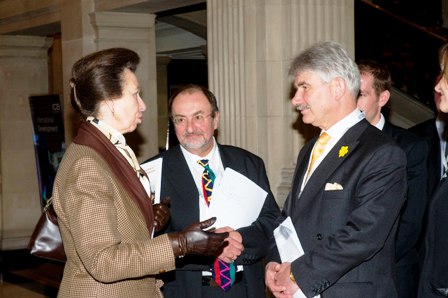
HRH The Princess Royal today stressed the global importance of the engineer in rebuilding the lives of those affected by natural disasters such as the recent earthquakes in Haiti, Chile and Turkey.
HRH was speaking at the 'Engineering a Better World' conference, organised by the Institution of Civil Engineers (ICE) and the Commonwealth Engineers' Council (CEC), to increase coordination between the efforts of charities, NGOs, public institutions, private companies and engineers in humanitarian aid. The event also marks the 2010 Commonwealth Week, which this year features a Science, Technology and Society theme.
Over 20 organisations across the Commonwealth and Latin America supported the event, which also saw speeches from Care International, Register of Engineers for Disaster Relief (RedR), the Royal Engineers, ARUP, Merlin, the Humanitarian Aid Relief Trust and ICE President Professor Paul Jowitt. Alfredo Brockmann, Advisor to the incoming Chilean government and structural engineer also spoke about the recent earthquake in Chile and the engineers' contribution to the relief operations.
HRH The Princess Royal, a patron of RedR since 1988, said: "Engineering forms an essential part of the humanitarian aid effort. Understanding the value and impact of the engineering solutions and skills available - and sharing this understanding - is vital in coordinating efficient disaster response.
"The recent disaster in Haiti presents a clear example of why engineering skills are of the utmost importance in mitigating the effects of disasters. The scale of destruction we have seen in Haiti isn't something we're used to and this is largely due to a lack of preventative engineering to ensure infrastructure is designed to withstand such forces of nature."
ICE President Professor, Paul Jowitt, said: "We know that when infrastructure fails, things go wrong. We saw it with the earthquakes in China, Pakistan, Italy, Indonesia and just recently in Haiti, Chile and Turkey. The scale of the damage and loss of life caused by these disasters just reinforces the urgency we face, in looking at how we can minimise the effects of such dramatic natural events."
Jo da Silva, Director, International Development, ARUP, said: "It is important to reflect on the lessons learned from previous post-disaster responses. This includes recognition by the humanitarian community of the need for engineering expertise, both in planning and implementing relief and re-construction programmes. But also the importance of engineers in recognising the complexities of post-disaster situations, and the need to enhance local capacity and generate livelihood opportunity so as to leave a legacy that is more than bricks and mortar."
Pete Sweetnam, Director of New Initiatives and Response, Merlin, said: "The engineering profession at large plays a huge role in addressing key relief operation issues, though the impact is magnified when the technical activities in areas such as shelter, safe water and accessible sanitation are balanced with community based activities. Taken together, these have a dramatic impact on the key life threatening health risks, security environment and dignity of those impacted by disasters. Whether emergency, recovery or development there can be no 'better society' without the engineer."